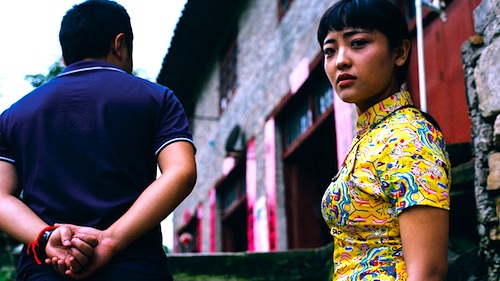By Joe Bendel. Chen Sheng is a much better uncle to his beloved nephew than his half-brother Crazy Face is a father to young Weiwei. Chen is also a medical doctor and a published poet, yet he is the one with a criminal record. Life is complicated for Chen, but he will have the opportunity reflect on his choices in proper Proustian fashion during the course of Bi Gan’s Kaili Blues, which screens during the 2015 Vancouver International Film Festival.
Chen bought into a medical practice established by the older Guang Lian in southeastern Kaili City. Except for Crazy Face, it is mostly quiet there, but that suits him fine. He tries to supply Weiwei with the things his father cannot or will not provide, so it greatly concerns him to hear Crazy Face may have sold the boy. Chen sets out after Weiwei, but a detour through provincial Dangmai holds unexpected significance. Time seems to warp for the medical poet, as he encounters a teenager who seems to be the Weiwei of the future and a hairdresser who is the spitting image of his late wife, Zhang Xi.
Blues is not exactly a plot driven film—and what narrative there is unfolds rather elliptically. However, as a mood piece it is pretty potent stuff. It is also visually quite striking, especially the Rope-like centerpiece sequence, in which the camera follows Chen and Yangyang, the older Weiwei’s sort of girlfriend as they walk throughout nearly every inch of the city and traverse back and forth across the river in a single, unbroken forty minute take. It is a technically accomplished bit of filmmaking, but it really works because Dangmai and the surrounding lush, verdant mountains are so wildly cinematic.

Yes, it looks great, but Chen Yongzhong’s scrupulously restrained performance is surprisingly powerful, in a hushed kind of way. He completely convinces us this is a man with an unresolved past. Though she only appears briefly, Liu Linyan is exquisitely arresting and vulnerable as the woman resembling Zhang Xi. Guo Yue is also terrific as Yangyang, subtly conveying her dissatisfaction and uncertainty for the future.
In most respects, Blues is a decidedly nonpolitical film, but occasional references to the disappearing Miao culture (that of the ethnic minority to which Bi belongs) peek through here and there. This is absolutely not a film for those who hold conventional tastes. Frankly, Bi does not want their patronage, so he is not about to compromise for their sake. The results can be glacial at times, but Wang Tianxing’s cinematography is lovely to look at and there is a real emotional center to it all. Recommended for admirers of slow cinema, Kaili Blues screens Sunday (9/27) and Wednesday (9/30), as part of this year’s VIFF.
LFM GRADE: B
Posted on September 25th, 2015 at 2:24pm.